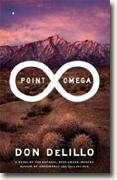Point Omega
Don DeLillo
book reviews:
· general fiction
· chick lit/romance
· sci-fi/fantasy
· graphic novels
· nonfiction
· audio books
· author interviews
· children's books @
curledupkids.com
· DVD reviews @
curledupdvd.com
newsletter
win books
buy online
links
home
for authors
& publishers
for reviewers

 |
Point Omega Don DeLillo Scribner Hardcover 128 pages February 2010 |
|
Point Omega
The younger man wants to make a film featuring Richard Elster, the older man, who was an advisor to warmongers. The younger man wants to get him up against a wall and hear what that was like. Ester tells him that they wanted “an individual of his interdisciplinary range, a man of reputation who might freshen the dialogue, broaden the viewpoint.” Someone who could bring new insight to the stumbling war on that adjective, terror, to “the blat and stammer of Iraq.” Someone who could deepen and make rigorous the banality of evil. The older man is not evil, just ambiguous. He’s non-committal about making a film but doesn’t dismiss the younger man out of hand. Elster is peripherally intrigued, so they talk it over in the desert. Drink on the deck of a house in the middle of nowhere Anza Borego. Think big thoughts in unassuming, tightly-wrought sentences that ripple the dunes and stir the tectonic hearts of desire, aspiration and fear as they speak of those all-too-human geological forces: war, nothing, meaning, destruction, creativity. Then, enter stage left, the daughter. Elster’s child is more or less the younger man’s contemporary. The dynamic in the house in the desert changes; the men go from mentor and student to family, from the professorship of history and aspiration to father and son as the younger two find a tenuous romantic camaraderie budging into their shared spaces. They touch spark points: “I never know what to say when he talks like that.” (The father is he who speaks like that.) “He’s been talking to students all his life,” responds the narrator. “He doesn’t expect anybody to say anything.” “Every second’s the last breath he takes.” Elster wrote an essay called “Renditions,” a sort of post-modern, follow an idea’s sound and fury and intuition until it yields up a brilliant Derridean thing, full of linguistic history, etymologies forged in the fire of cultural exigency and burning with intelligence. The essay began, “A government is a criminal enterprise.” It caught the attention of the defense sector - and got him hired into the Pentagon as a consultant. (As John Le Carré showed us in A Most Wanted Man, a successful rendition takes great cunning of narrative; the botched ones, where the public finds out and becomes enraged and full of scrutiny, are plots full of holes, failures of the imagination.) These characters pay close attention to the details of story: of life history, relationships, careers, legacies - or at least try to, as does the narrator of the frame story, whose life barely intersects with those of the interior narrative. That other narrator stands against a museum wall (not unlike the way the younger man wants Elster to), in an art installation, watching 24-hour Psycho, the Hitchcock perennial: the film is slowed down until it takes a day to run: “It takes close attention to see what is happening in front of you. It takes work, pious effort, to see what you are looking at...., the depth of things so easy to miss in the shallow habit of seeing.”But, then there is the “omega point,” the end of time and knowing: “a leap out of biology,” and the begging question that leaks forth from exhaustion: “Do we have to be human forever?” And exhausted, “We want to be stones in a field,” done with consciousness at last. We want to be disappeared in the desert, invisible to the habit of seeing, to become the pure phenomena of analysis free of intention. And then the terrible thing happens that rips the story, and we are forced from the desert, forced out of the haven of the story, back to mule-ing our burdens through reality. Such a short book, such a heavy sigh, such a scimitar-like way to have the top of your head taken off, to be opened up to something inexorable, tragic, limpid and therefore nevertheless resigned to be determined to do the best possible thing. Point Omega Originally published on Curled Up With A Good Book at www.curledup.com. © Brian Charles Clark, 2010 |
| Also by Don DeLillo: |
|
|
|
 Click here to learn more about this month's sponsor! |
|
| fiction · sf/f · comic books · nonfiction · audio newsletter · free book contest · buy books online review index · links · · authors & publishers reviewers |
|
| site by ELBO Computing Resources, Inc. | |
 As if by touched by fate or brushing up against coincidence, the novel’s bookends (the outer story) communicates only barely with the story in the middle. The inside story is woven by three characters who spend their time talking.
As if by touched by fate or brushing up against coincidence, the novel’s bookends (the outer story) communicates only barely with the story in the middle. The inside story is woven by three characters who spend their time talking.